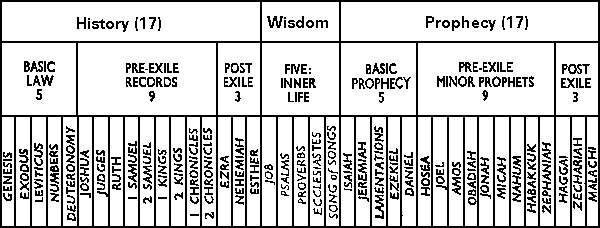
Though we speak of the Bible as one book -- and it can rightly be considered as such -- it is also a collection of documents written by about 40 different divinely-inspired authors over a period of at least 1,500 years. Each document was originally written as a stand-alone letter, historical account, prophetic message, group of worship songs, or a collection of wise sayings.

Animated version of this graphic
Note: The writings of the Old Testament are arranged by type of writing. They are not in strict chronological order, although there is then quite a bit of chronological order within each grouping. [ Another Another way of understanding how the biblical writings are organized ]
-- Howard Culbertson, hculbert@snu.edu
The Old Testament is divided into several distinct groups of books> Books in each group or genre serve a specific purpose within the Hebrew Bible or Old Testament. The first grouping contains the books of the Torah, also known as the Pentateuch. These are the five foundational texts of Judaism: Genesis, Exodus, Leviticus, Numbers, and Deuteronomy. These books describe the creation of the world, the covenant between God and the Israelites, and the laws and rituals governing their lives.
Following the Torah are the historical books. These documents narrate the history of the Israelites from their conquest of Canaan to the Babylonian exile, including stories of figures like Joshua, Samuel, and various kings. The next grouping is the wisdom literature such as Psalms, Proverbs, and Ecclesiastes. These writings offer philosophical reflections, prayers, and practical guidance.
Finally, there are the prophetic books, which are divided into major prophets like Isaiah and Jeremiah and minor prophets like Amos and Hosea. These writings contain messages of warning, judgment, and hope for God's people. Note: The words "major" and "minor" do not refer to importance. They refer to the length of the documents. For example, Isaiah, a major prophet, has 66 chapters. Jonah, a "minor" prophet, has four chapters. However, the things that God has to say to us through these books are equally important.